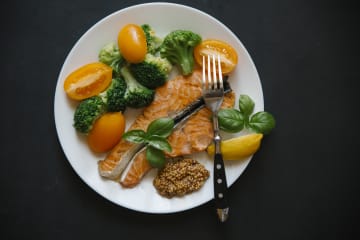
Overview
To help your symptoms, your doctor has recommended a gluten-free diet. This means not eating foods that have gluten in them. Gluten is a kind of protein. It's found in wheat, barley, and rye.
If you eat a gluten-free diet, you can help manage your symptoms and prevent long-term problems. You can also get all the nutrition you need.
Follow-up care is a key part of your treatment and safety. Be sure to make and go to all appointments, and call your doctor if you are having problems. It's also a good idea to know your test results and keep a list of the medicines you take.
How can you care for yourself at home?
- Avoid all foods that contain wheat, rye, and barley. Foods that are often made with these grains include bread, bagels, pasta, pizza, malted breakfast cereals, and crackers.
- Carefully read food labels. Look for wheat or wheat products in ice cream and candy. You may also find them in salad dressing, canned and frozen soups and vegetables, and other processed foods.
- Avoid all beer products unless the label says they are gluten-free. Beers with and without alcohol have gluten unless the labels say they are gluten-free. This includes lagers, ales, and stouts.
- Avoid oats, at least at first. Oats may cause symptoms in some people, perhaps as a result of contamination with wheat, barley, or rye during processing. But many people who have celiac disease can eat moderate amounts of oats without having symptoms. Health professionals vary in their long-term recommendations regarding eating foods with oats. But most agree it is safe to eat oats labeled as gluten-free.
- When you eat out, look for restaurants that serve gluten-free food. You can also ask if the chef is familiar with gluten-free cooking.
- Look for gluten-free foods. Many food stores offer specially marked gluten-free food. And you can look online for gluten-free foods and recipes.
- On a gluten-free eating plan, it's okay to have:
- Eggs and dairy products. (But some dairy products may make your symptoms worse. Ask your doctor if you have questions about dairy products. Read ingredient labels carefully. Some processed cheeses contain gluten.)
- Flours and foods made with amaranth, arrowroot, beans, buckwheat, corn, cornmeal, flax, millet, potatoes, gluten-free oat bran, quinoa, rice, sorghum, soybeans, tapioca, or teff.
- Fresh, frozen, or canned meats. Be sure to check the ingredient list on processed meats like hot dogs, salami, or deli meat. These may have added ingredients that contain gluten.
- Fresh, frozen, dried, or canned fruits and vegetables, if they do not have thickeners or other additives that contain gluten.
- Some alcohol drinks. These include wine, liqueurs, and ciders. They also include liquor like whiskey and brandy.
When should you call for help?
Watch closely for changes in your health, and be sure to contact your doctor if:
- You have unexplained weight loss.
- You have diarrhea that lasts longer than 1 to 2 weeks.
- You have unusual fatigue or mood changes, especially if these last more than a week and are not related to any other illness, such as the flu.
- Your symptoms come back again.
- Your stomach pain gets worse.
Where can you learn more?
Go to http://www.healthwise.net/patientEd
Enter O549 in the search box to learn more about "Gluten-Free Diet: Care Instructions".
Current as of: October 7, 2025
Author: Ignite Healthwise, LLC Staff
Clinical Review Board
All Ignite Healthwise, LLC education is reviewed by a team that includes physicians, nurses, advanced practitioners, registered dieticians, and other healthcare professionals.

